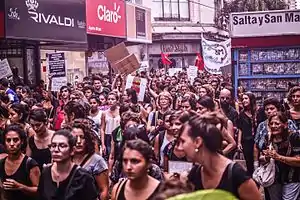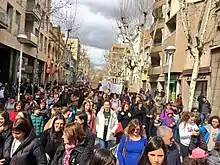International Women's Strike
The International Women's Strike, also known as Paro Internacional de Mujeres, is a global movement coordinated across over 50 countries and coinciding with International Women's Day, on 8 March 2017 and 2018.[1] The United Nations announced the theme of "Women in the Changing World of Work: Planet 50-50 by 2030", calling for gender equality around the globe.[2] In the United States, the strike was branded as "Day Without a Woman".[3]
| International Women's Strike | |
|---|---|
 Demonstrators in Santa Fe, Argentina, where the protest was called Paro Internacional de Mujeres | |
| Date | 8 March 2017 8 March 2018 |

Background
On 3 October 2016 women in Poland organized a nationwide strike following a Polish parliamentary decision to consider a ban on abortion that would criminalize all terminations.[4] The day became known as Black Monday.[5]
19 October 2016 saw the #NiUnaMenos protest against femicide in Argentina, a large-scale response to the murder of 16-year-old Lucía Pérez.[6] Similar demonstrations took place in other Latin American countries including Mexico, El Salvador, Chile, and others.[7] A week later, on 25 October 2017, Brazil held its own #NiUnaMenos strike.[8]
Women's groups in Poland, including the All-Poland Women's Strike, who had organised the Black Protests against proposed legislation that would have tightened Polish abortion law in 2016, together with the Argentinian women's rights activists launched the International Women's Strike in 2017. The Polish and Argentinian groups coordinated using long proprietary software voice over IP discussions together with women from 28 other countries for preparing the strike. This led to strikes in many countries, including techniques such as rallies and banging pots.[9]
Participating countries
Over 50 countries participated in the International Women's Strike.[10]
Ireland
In Ireland, the platform titled "Strike 4 Repeal" demanded: "[...] that the Irish government call a referendum to repeal the 8th amendment by the 8th of March. If not, we will strike."[11] The strike action was inspired by the Black Protest in Poland months earlier.[12]
United States
In the United States, A Day Without a Woman was a general strike held on 8 March 2017 and organized by two different groups—the 2017 Women's March and a separate International Women's Strike movement. The two groups asked that women not work that day to protest the policies of the administration of Donald Trump, encouraging women to refrain from working, spending money (or, alternatively, electing to shop only at "small, women- and minority-owned businesses"), and to wear red as a sign of solidarity.[13][14]
Spain
On 8 March 2018, the Spanish feminist movement called for a 24-hour strike. The slogan of the day was "If we stop, the world stops." Instead of the strike being a simple labor strike, women were encourage to strike in other aspects of their lives. Women "were summoned to stop working, to stop attending classes, to cease to undertake care work and to avoid consuming." [9] Almost 6 million workers participated in the strike and joined marches in cities across the country. After the International Women's Strike was organized in 2017 and carried out, the next day, several feminist organizations started working together to make the 24 hour strike on 8 March 2018 have a bigger impact. The 8 March Commission was the commission that organized the 8 March demonstration in Madrid in previous years. This commission began meeting on the 8th of every month to organize a general strike in Spain which needed cooperation from many feminist groups in the country. This led to the creation of a national 8 March commission. Local 8 March committees were created everywhere in the country as well, including cities and towns. They have monthly meetings where anyone can attend. Some meetings in Madrid have drawn as many as 200 women.
In 2018, the strike call that the national commission wanted was going to tackle "gender violence, bodies and the right to choose, borders and the economy." The commission was fairly diverse, with women having been in the precious cycle of protests in the 70s. Hundreds of organizations as well as local political groups supported the strike. Due to the success of the strike call, the issues that were raised gained major importance with media outlets and the press.'
References
- "About the IWS – womenstrikeus.org". www.womenstrikeus.org. Retrieved 20 March 2017.
- "International Women's Day 2017". UN Women. Retrieved 22 March 2017.
- Cooney, Samantha (2017). "Meet the Organizers Behind the Upcoming Worldwide Women's Strike". Motto. Retrieved 20 March 2017.
- Davies, Christian (3 October 2016). "Women to go on strike in Poland in protest at planned abortion law". The Guardian. ISSN 0261-3077. Retrieved 21 March 2017.
- "Black Monday: Polish women strike against abortion ban". 3 October 2016 – via www.bbc.com.
- Español, Por CNN (19 October 2016). "#NiUnaMenos: el brutal asesinato de Lucía Pérez en Argentina moviliza a las mujeres del mundo".
- Goñi, Uki (19 October 2016). "Argentina's women joined across South America in marches against violence". The Guardian. ISSN 0261-3077. Retrieved 21 March 2017.
- Jensen, Emily. "Ni Una Menos Reaches Rio: Is There Hope To End Gender Violence In Brazil? | The Bubble | Argentina News". www.thebubble.com. Archived from the original on 15 April 2018. Retrieved 21 March 2017.
- James, Selma (8 March 2018). "Decades after Iceland's 'day off', our women's strike is stronger than ever | Selma James". The Guardian. ISSN 0261-3077. Retrieved 3 December 2019.
- York, Alexandra Topping Molly Redden in New (7 March 2017). "'We are international, we are everywhere': women unite in global strike" – via The Guardian.
- "Strike for Repeal | March 8th 2017". strike4repeal.org. Retrieved 20 March 2017.
- Moskalewicz, Magdalena (8 March 2017). "Today's women's strike has its roots in Poland — where women have a lot to be angry about". The Washington Post. ISSN 0190-8286. Retrieved 20 March 2017.
- Ashley Killough; Eric Bradner. "Female lawmakers support 'Day Without Women'". CNN.
- Abrams, Susan Chira, Rachel; Rogers, Katie (8 March 2017). "'Day Without a Woman' Protest Tests a Movement's Staying Power" – via NYTimes.com.
External links
| Wikimedia Commons has media related to International Women's Strike. |